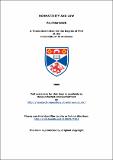Files in this item
Normativity and law
Item metadata
| dc.contributor.advisor | Skorupski, John | |
| dc.contributor.author | Markwick, Paul | |
| dc.coverage.spatial | 268 p. | en_US |
| dc.date.accessioned | 2015-08-31T10:47:21Z | |
| dc.date.available | 2015-08-31T10:47:21Z | |
| dc.date.issued | 2000 | |
| dc.identifier.uri | https://hdl.handle.net/10023/7363 | |
| dc.description.abstract | An action's illegality can be irrelevant to a reason not to perform it. A plausible example of a reason not to assault is that assault causes suffering. Since assault is illegal, the reason pertains to a legally proscribed action. Still, assault's illegality is irrelevant in this case: the reason would pertain (assault would cause suffering; we would have reason not to assault) even if assault were not legally proscribed. On the other hand, it appears that a reason can be one that derives from the interposition of law. This thesis is about reasons of this second type (legal reasons). In particular, it is about their formal features. For example, it is about their individuating conditions (when are p and q two legal reasons rather than one?) and about how legal reasons can be second-order rather than first-order (what follows when p is a reason not to have another reason figure in deliberation about action?). Most particularly, however, it is about their identity conditions (if p is a reason, when and only when is p a legal reason?). I argue against three widely-accepted claims about the nature of legal reasons: (i) p is a legal reason only if p is a content-independent reason (chapters 5 and 6); (ii) if p is a legal reason to ¢, p could be a complete reason to ¢ or a part of a complete reason to ¢ (chapters 2, 3 and 4); (iii) a legal reason p has a significant formal feature when p is an exclusionary reason (chapter 8). I also argue that one argument to the conclusion that analytical jurisprudence must pay special to attention moral legal reasons - an argument seen in recent work by R. A. Duff - is unconvincing (chapter 7). | en_US |
| dc.language.iso | en | en_US |
| dc.publisher | University of St Andrews | |
| dc.title | Normativity and law | en_US |
| dc.type | Thesis | en_US |
| dc.contributor.sponsor | Committee of Vice-Chancellors and Principals of the Universities of the United Kingdom | en_US |
| dc.contributor.sponsor | May Wong Smith Trust | en_US |
| dc.type.qualificationlevel | Doctoral | en_US |
| dc.type.qualificationname | PhD Doctor of Philosophy | en_US |
| dc.publisher.institution | The University of St Andrews | en_US |
This item appears in the following Collection(s)
Items in the St Andrews Research Repository are protected by copyright, with all rights reserved, unless otherwise indicated.

